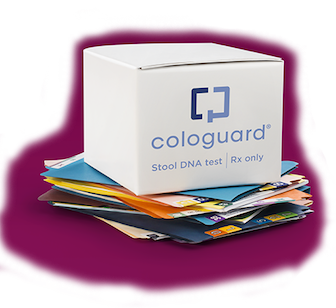
Understanding Cologuard
WHAT is Cologuard?
Cologuard finds both cancer and precancer. The earlier colon cancer is detected, the easier it is to treat. In a large clinical study, Cologuard found more cancers and precancers than a leading fecal blood test (OC FIT-CHEK, Polymedco, Inc.).
A stool sample is collected at home with a kit that is provided by Cologuard. This process involves placing a plastic collection bucket on the toilet seat, collecting the stool sample, scraping the sample with a collection probe and placing the remaining stool sample in a liquid solution. The sample needs to be shipped to a laboratory for evaluation within three days of collection.
HOW does Cologuard work?
Every day the lining of your colon naturally sheds cells. If you have cancer and precancer in your colon, abnormal cells shed into the colon, along with normal cells. The shedding cells are picked up by stool as it passes through your colon.
Cologuard uses advanced stool DNA technology to find DNA from these abnormal cells and hemoglobin from red blood cells.
Cologuard is not a genetic test because it does not provide information on inherited risk. Cologuard looks only for altered DNA associated with colon cancer and precancer.
WHAT are the benefits of using Cologuard?
Cologuard…
- Is noninvasive and easy to use in your own home, requiring no time off to prepare, dietary restrictions, or changes in medication
- Uses the latest advances in stool DNA science
- Finds more cancer and precancer than a leading fecal blood test (OC FIT-CHEK, Polymedco, Inc.)
What are the risks & precautions associated with Cologuard?
Cologuard may produce false negative or false positive results:
-
A false positive occurs when Cologuard produces a positive result, even though a colonoscopy will not find cancer or precancer. Any positive result should be followed by diagnostic colonoscopy.
-
A false negative occurs when Cologuard does not detect colon cancer or precancer even when a colonoscopy identifies the positive result. Following a negative result, patients should continue participating in a screening program at an interval and with a method appropriate for the individual patient.
Cologuard performance has been established in clinical trial at a single point in time. Performance when used for repeat testing has not been evaluated or established.
Patients should not provide a sample if they have diarrhea or blood in their urine or stool (for example, bleeding hemorrhoids, bleeding cuts or wounds on their hands, rectal bleeding, or menstruation).
The risks related to using the Cologuard Collection Kit are low, with no serious adverse events reported among people in a clinical trial. Patients should be careful when opening and closing the lids to avoid the risk of hand strain.
For complete information on Cologuard, please click here.
Is Cologuard right for me?
Cologuard is a noninvasive option for colon cancer screening for people who are:
-
Men and women 45 years or older
-
At average risk for colon cancer
Cologuard may not be right for you if:
- You have a personal history of colon cancer, polyps, or other related cancers
- You have a family history of colon cancer
- You have had a positive result for another screening method in the last six months
- You have been diagnosed with a condition that places you at high risk for colon cancer. These include but are not limited to: Inflammatory Bowel Disease, Chronic ulcerative colitis, Crohn’s disease, Familial adenomatous polyposis
- You have been diagnosed with a relevant cancer syndrome passed on from your family, such as Hereditary non-polyposis colorectal cancer syndrome, Peutz-Jeghers Syndrome, MYH-Associated Polyposis, Gardner’s syndrome, Turcot’s (or Crail’s) syndrome, Cowden’s syndrome, Juvenile Polyposis, Cronkhite-Canada syndrome, Neurofibromatosis, or Familial Hyperplastic Polyposis
How does Cologuard compare to other non-invasive tests?

The fecal immunochemical test, also known as “FIT”, is a noninvasive colorectal cancer screening test that has been around for many years. The FIT test is widely available and is included in all the U.S. colorectal cancer screening guidelines.
In clinical studies, Cologuard® found 92% of colon cancers and 42% of advanced precancerous tissue in the colon; in other words, it missed 8% of colon cancers and it missed almost 60% of the advanced precancerous tissue. It was more sensitive than the FIT test in detecting colorectal cancer however, false positives and false negatives can occur with any test. Cologuard® was positive in 13% of people without cancer as compared to the FIT test with a 5% false-positive rate.
What does Cologuard Cost?
The cost for each Cologuard® test is $599 which is covered by Medicare and some insurers and should be repeated every 3 years. In comparison, the cost for the FIT test is $25.

Ask the doctor if Cologuard is right for you.
If you have any questions, please feel free to ask the doctor, GI nurse, or the technician.
Dr. Bhandari has staff privileges
at the following hospitals:

Monday, Wednesday
& every other Thursday

Tuesday & every
other Thursday

Every other Friday
Our Location:
Monday to Friday: 8:00 AM to 5:00 PM.
616 South Washington | Bastrop, LA 71220 | PH: 318 283-3990
